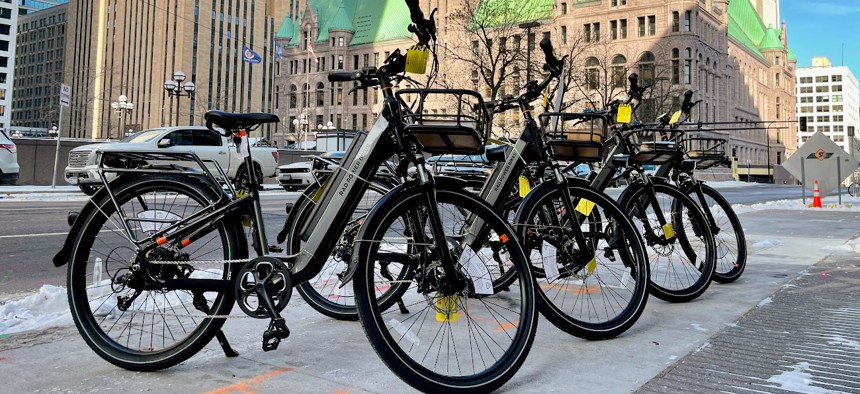Infrastructure Update: Adding E-bikes to Municipal Fleets

The e-bikes a Minneapolis city agency recently added to its fleet to help employees get around. City of Minneapolis
In Minneapolis, a city agency purchased four electric-assist bikes to help employees get around on the job. Departments in other cities have also been experimenting with the bikes.
This is an archived version of Route Fifty's weekly Infrastructure Update newsletter. Subscribe here to receive the newsletter by email.
****
Hello and welcome back to Route Fifty's Infrastructure Update, I'm Dan Vock. Today we're switching gears and looking at electric-assist bikes. They've been gaining popularity among cyclists and in bikeshare services. But now a few cities are buying them for their own staff to use. We're looking at one of these places to get a sense of how the switch is going.
Recently, Minneapolis' inspections services division ordered four new e-bikes to supplement its fleet of SUVs for inspectors. Kellie Jones, the director of the division, said the idea originally came from her staff. The division bought its first e-bike nearly a year ago, and the experience proved beneficial enough that the agency decided to add the additional bikes.
The division's inspectors check up on rental properties and do fire inspections for some commercial buildings, so they're in their cars a lot, Jones explained.
When the inspectors approached management about the idea of using e-bikes on the job, they said it would support the city's green initiatives, plus improve the well-being of the inspectors themselves. The trial run went smoothly, with inspectors riding hundreds of miles that otherwise would have been traveled in motor vehicles.
Inspectors can choose when to take e-bikes instead of their standard vehicles, so Jones anticipates that the new bikes will be most heavily used in the spring and fall. But there are a few die-hards on staff who will use them throughout the year.
"It won't replace our fleet. We still have a fleet and intend to have a fleet of gas-powered vehicles," Jones said. "But now we have an alternative, so people can swap out their gas-powered vehicles for these really lovely electric bikes."
Using the e-bikes might not make sense in situations where inspectors have to travel from one end of the city to the other, but most of the department's inspectors focus on 50 to 100 properties in a given geographical region, Jones explained. So having an e-bike to get to all those sites "makes a lot of sense," she said.
The rollout of e-bikes for a city agency also makes sense in a place where cycling has been growing in popularity, and the infrastructure to support it has grown as well. Minneapolis and neighboring St. Paul consistently rank high among U.S. cities for quality bike infrastructure. After winter storms, Minneapolis plows protected bike lanes and paths used by cyclists.
Other cold-weather cities, including Boston and Madison, Wisconsin, have also tried out bringing e-bikes to their municipal fleets. Madison uses cargo e-bikes to move parts for its fleet division to different locations and to help with landscaping projects. Portland, Oregon is also using cargo e-bikes to help with trail maintenance. Boston added an electric-assist cargo bike in 2020 to help in various city operations.
The Biden administration and many state and local leaders in recent years have pushed to replace government fleets of gas-powered vehicles with electric vehicles. But government adoption of electric-assist bikes has been far slower.
Meanwhile, though, e-bikes have been growing even more popular with the public. Bikeshare services now often include e-bikes among their rental choices. The bikeshare company JUMP, in fact, offers exclusively battery-assisted bicycles. Some cities, like New York, have tried to promote the use of cargo e-bikes to replace trucks by allowing them to use existing loading areas without having to pay meters.
Consumer demand for e-bikes (and bicycles generally) has surged too, particularly since the onset of the pandemic. Sales of e-bikes doubled between 2019 and 2020. During the first nine months of 2021, they were 47% higher than in 2020.
The surge in demand, plus supply chain snarls, have led to long delays for many consumers who want to get their hands on a new e-bike.
Luckily, for the Minneapolis inspectors, Jones said there were no substantial snags getting her agency's e-bikes. And procurement was relatively simple, because the cost of the bikes was small enough that they didn't need a more complex bidding process.
That's it for this week's edition. If you haven't already, consider signing up here for Route Fifty Today, our daily newsletter, where you can stay up to date on the latest trends and best practices happening in state and local government nationwide. If you have news tips or feedback, if you want to share your community's story, or if you just want to say hello, please email me at dvock@govexec.com and follow me on Twitter at @danvock. Thanks for reading!






